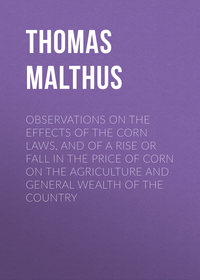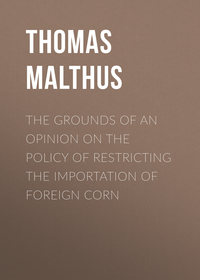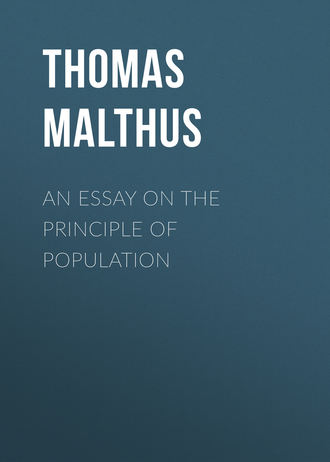 полная версия
полная версияAn Essay on the Principle of Population
The evil is perhaps gone too far to be remedied, but I feel little doubt in my own mind that if the poor laws had never existed, though there might have been a few more instances of very severe distress, yet that the aggregate mass of happiness among the common people would have been much greater than it is at present.
Mr Pitt's Poor Bill has the appearance of being framed with benevolent intentions, and the clamour raised against it was in many respects ill directed, and unreasonable. But it must be confessed that it possesses in a high degree the great and radical defect of all systems of the kind, that of tending to increase population without increasing the means for its support, and thus to depress the condition of those that are not supported by parishes, and, consequently, to create more poor.
To remove the wants of the lower classes of society is indeed an arduous task. The truth is that the pressure of distress on this part of a community is an evil so deeply seated that no human ingenuity can reach it. Were I to propose a palliative, and palliatives are all that the nature of the case will admit, it should be, in the first place, the total abolition of all the present parish-laws. This would at any rate give liberty and freedom of action to the peasantry of England, which they can hardly be said to possess at present. They would then be able to settle without interruption, wherever there was a prospect of a greater plenty of work and a higher price for labour. The market of labour would then be free, and those obstacles removed which, as things are now, often for a considerable time prevent the price from rising according to the demand.
Secondly, premiums might be given for turning up fresh land, and it possible encouragements held out to agriculture above manufactures, and to tillage above grazing. Every endeavour should be used to weaken and destroy all those institutions relating to corporations, apprenticeships, etc., which cause the labours of agriculture to be worse paid than the labours of trade and manufactures. For a country can never produce its proper quantity of food while these distinctions remain in favour of artisans. Such encouragements to agriculture would tend to furnish the market with an increasing quantity of healthy work, and at the same time, by augmenting the produce of the country, would raise the comparative price of labour and ameliorate the condition of the labourer. Being now in better circumstances, and seeing no prospect of parish assistance, he would be more able, as well as more inclined, to enter into associations for providing against the sickness of himself or family.
Lastly, for cases of extreme distress, county workhouses might be established, supported by rates upon the whole kingdom, and free for persons of all counties, and indeed of all nations. The fare should be hard, and those that were able obliged to work. It would be desirable that they should not be considered as comfortable asylums in all difficulties, but merely as places where severe distress might find some alleviation. A part of these houses might be separated, or others built for a most beneficial purpose, which has not been infrequently taken notice of, that of providing a place where any person, whether native or foreigner, might do a day's work at all times and receive the market price for it. Many cases would undoubtedly be left for the exertion of individual benevolence.
A plan of this kind, the preliminary of which should be an abolition of all the present parish laws, seems to be the best calculated to increase the mass of happiness among the common people of England. To prevent the recurrence of misery, is, alas! beyond the power of man. In the vain endeavour to attain what in the nature of things is impossible, we now sacrifice not only possible but certain benefits. We tell the common people that if they will submit to a code of tyrannical regulations, they shall never be in want. They do submit to these regulations. They perform their part of the contract, but we do not, nay cannot, perform ours, and thus the poor sacrifice the valuable blessing of liberty and receive nothing that can be called an equivalent in return.
Notwithstanding, then, the institution of the poor laws in England, I think it will be allowed that considering the state of the lower classes altogether, both in the towns and in the country, the distresses which they suffer from the want of proper and sufficient food, from hard labour and unwholesome habitations, must operate as a constant check to incipient population.
To these two great checks to population, in all long occupied countries, which I have called the preventive and the positive checks, may be added vicious customs with respect to women, great cities, unwholesome manufactures, luxury, pestilence, and war.
All these checks may be fairly resolved into misery and vice. And that these are the true causes of the slow increase of population in all the states of modern Europe, will appear sufficiently evident from the comparatively rapid increase that has invariably taken place whenever these causes have been in any considerable degree removed.
CHAPTER 6
New colonies—Reasons for their rapid increase—North American Colonies—Extraordinary instance of increase in the back settlements—Rapidity with which even old states recover the ravages of war, pestilence, famine, or the convulsions of nature.
It has been universally remarked that all new colonies settled in healthy countries, where there was plenty of room and food, have constantly increased with astonishing rapidity in their population. Some of the colonies from ancient Greece, in no very long period, more than equalled their parent states in numbers and strength. And not to dwell on remote instances, the European settlements in the new world bear ample testimony to the truth of a remark, which, indeed, has never, that I know of, been doubted. A plenty of rich land, to be had for little or nothing, is so powerful a cause of population as to overcome all other obstacles. No settlements could well have been worse managed than those of Spain in Mexico, Peru, and Quito. The tyranny, superstition, and vices of the mother-country were introduced in ample quantities among her children. Exorbitant taxes were exacted by the Crown. The most arbitrary restrictions were imposed on their trade. And the governors were not behind hand in rapacity and extortion for themselves as well as their master. Yet, under all these difficulties, the colonies made a quick progress in population. The city of Lima, founded since the conquest, is represented by Ulloa as containing fifty thousand inhabitants near fifty years ago. Quito, which had been but a hamlet of indians, is represented by the same author as in his time equally populous. Mexico is said to contain a hundred thousand inhabitants, which, notwithstanding the exaggerations of the Spanish writers, is supposed to be five times greater than what it contained in the time of Montezuma.
In the Portuguese colony of Brazil, governed with almost equal tyranny, there were supposed to be, thirty years since, six hundred thousand inhabitants of European extraction.
The Dutch and French colonies, though under the government of exclusive companies of merchants, which, as Dr Adam Smith says very justly, is the worst of all possible governments, still persisted in thriving under every disadvantage.
But the English North American colonies, now the powerful people of the United States of America, made by far the most rapid progress. To the plenty of good land which they possessed in common with the Spanish and Portuguese settlements, they added a greater degree of liberty and equality. Though not without some restrictions on their foreign commerce, they were allowed a perfect liberty of managing their own internal affairs. The political institutions that prevailed were favourable to the alienation and division of property. Lands that were not cultivated by the proprietor within a limited time were declared grantable to any other person. In Pennsylvania there was no right of primogeniture, and in the provinces of New England the eldest had only a double share. There were no tithes in any of the States, and scarcely any taxes. And on account of the extreme cheapness of good land a capital could not be more advantageously employed than in agriculture, which at the same time that it supplies the greatest quantity of healthy work affords much the most valuable produce to the society.
The consequence of these favourable circumstances united was a rapidity of increase probably without parallel in history. Throughout all the northern colonies, the population was found to double itself in twenty-five years. The original number of persons who had settled in the four provinces of new England in 1643 was 21,200.(I take these figures from Dr Price's two volumes of Observations; not having Dr Styles' pamphlet, from which he quotes, by me.) Afterwards, it is supposed that more left them than went to them. In the year 1760, they were increased to half a million. They had therefore all along doubled their own number in twenty-five years. In New Jersey the period of doubling appeared to be twenty-two years; and in Rhode island still less. In the back settlements, where the inhabitants applied themselves solely to agriculture, and luxury was not known, they were found to double their own number in fifteen years, a most extraordinary instance of increase. Along the sea coast, which would naturally be first inhabited, the period of doubling was about thirty-five years; and in some of the maritime towns, the population was absolutely at a stand.
(In instances of this kind the powers of the earth appear to be fully equal to answer it the demands for food that can be made upon it by man. But we should be led into an error if we were thence to suppose that population and food ever really increase in the same ratio. The one is still a geometrical and the other an arithmetical ratio, that is, one increases by multiplication, and the other by addition. Where there are few people, and a great quantity of fertile land, the power of the earth to afford a yearly increase of food may be compared to a great reservoir of water, supplied by a moderate stream. The faster population increases, the more help will be got to draw off the water, and consequently an increasing quantity will be taken every year. But the sooner, undoubtedly, will the reservoir be exhausted, and the streams only remain. When acre has been added to acre, till all the fertile land is occupied, the yearly increase of food will depend upon the amelioration of the land already in possession; and even this moderate stream will be gradually diminishing. But population, could it be supplied with food, would go on with unexhausted vigour, and the increase of one period would furnish the power of a greater increase the next, and this without any limit.)
These facts seem to shew that population increases exactly in the proportion that the two great checks to it, misery and vice, are removed, and that there is not a truer criterion of the happiness and innocence of a people than the rapidity of their increase. The unwholesomeness of towns, to which some persons are necessarily driven from the nature of their trades, must be considered as a species of misery, and every the slightest check to marriage, from a prospect of the difficulty of maintaining a family, may be fairly classed under the same head. In short it is difficult to conceive any check to population which does not come under the description of some species of misery or vice.
The population of the thirteen American States before the war was reckoned at about three millions. Nobody imagines that Great Britain is less populous at present for the emigration of the small parent stock that produced these numbers. On the contrary, a certain degree of emigration is known to be favourable to the population of the mother country. It has been particularly remarked that the two Spanish provinces from which the greatest number of people emigrated to America, became in consequence more populous. Whatever was the original number of British emigrants that increased so fast in the North American Colonies, let us ask, why does not an equal number produce an equal increase in the same time in Great Britain? The great and obvious cause to be assigned is the want of room and food, or, in other words, misery, and that this is a much more powerful cause even than vice appears sufficiently evident from the rapidity with which even old states recover the desolations of war, pestilence, or the accidents of nature. They are then for a short time placed a little in the situation of new states, and the effect is always answerable to what might be expected. If the industry of the inhabitants be not destroyed by fear or tyranny, subsistence will soon increase beyond the wants of the reduced numbers, and the invariable consequence will be that population which before, perhaps, was nearly stationary, will begin immediately to increase.
The fertile province of Flanders, which has been so often the seat of the most destructive wars, after a respite of a few years, has appeared always as fruitful and as populous as ever. Even the Palatinate lifted up its head again after the execrable ravages of Louis the Fourteenth. The effects of the dreadful plague in London in 1666 were not perceptible fifteen or twenty years afterwards. The traces of the most destructive famines in China and Indostan are by all accounts very soon obliterated. It may even be doubted whether Turkey and Egypt are upon an average much less populous for the plagues that periodically lay them waste. If the number of people which they contain be less now than formerly, it is, probably, rather to be attributed to the tyranny and oppression of the government under which they groan, and the consequent discouragements to agriculture, than to the loss which they sustain by the plague. The most tremendous convulsions of nature, such as volcanic eruptions and earthquakes, if they do not happen so frequently as to drive away the inhabitants, or to destroy their spirit of industry, have but a trifling effect on the average population of any state. Naples, and the country under Vesuvius, are still very populous, notwithstanding the repeated eruptions of that mountain. And Lisbon and Lima are now, probably, nearly in the same state with regard to population as they were before the last earthquakes.
CHAPTER 7
A probable cause of epidemics—Extracts from Mr Suessmilch's tables—Periodical returns of sickly seasons to be expected in certain cases—Proportion of births to burials for short periods in any country an inadequate criterion of the real average increase of population—Best criterion of a permanent increase of population—Great frugality of living one of the causes of the famines of China and Indostan—Evil tendency of one of the clauses in Mr Pitt's Poor Bill—Only one proper way of encouraging population—Causes of the Happiness of nations—Famine, the last and most dreadful mode by which nature represses a redundant population—The three propositions considered as established.
By great attention to cleanliness, the plague seems at length to be completely expelled from London. But it is not improbable that among the secondary causes that produce even sickly seasons and epidemics ought to be ranked a crowded population and unwholesome and insufficient food. I have been led to this remark, by looking over some of the tables of Mr Suessmilch, which Dr Price has extracted in one of his notes to the postscript on the controversy respecting the population of England and Wales. They are considered as very correct, and if such tables were general, they would throw great light on the different ways by which population is repressed and prevented from increasing beyond the means of subsistence in any country. I will extract a part of the tables, with Dr Price's remarks.
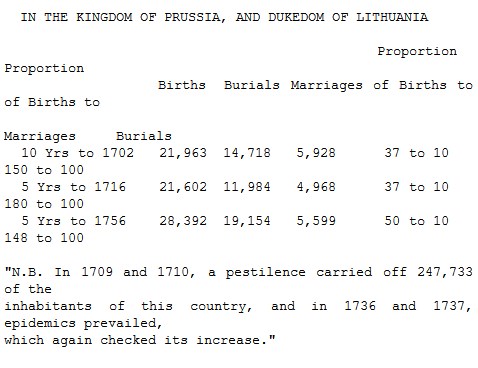
It may be remarked, that the greatest proportion of births to burials, was in the five years after the great pestilence.
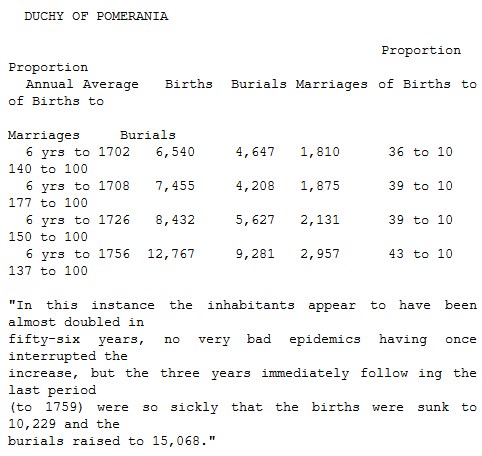
Is it not probable that in this case the number of inhabitants had increased faster than the food and the accommodations necessary to preserve them in health? The mass of the people would, upon this supposition, be obliged to live harder, and a greater number would be crowded together in one house, and it is not surely improbable that these were among the natural causes that produced the three sickly years. These causes may produce such an effect, though the country, absolutely considered, may not be extremely crowded and populous. In a country even thinly inhabited, if an increase of population take place, before more food is raised, and more houses are built, the inhabitants must be distressed in some degree for room and subsistence. Were the marriages in England, for the next eight or ten years, to be more prolifick than usual, or even were a greater number of marriages than usual to take place, supposing the number of houses to remain the same, instead of five or six to a cottage, there must be seven or eight, and this, added to the necessity of harder living, would probably have a very unfavourable effect on the health of the common people.
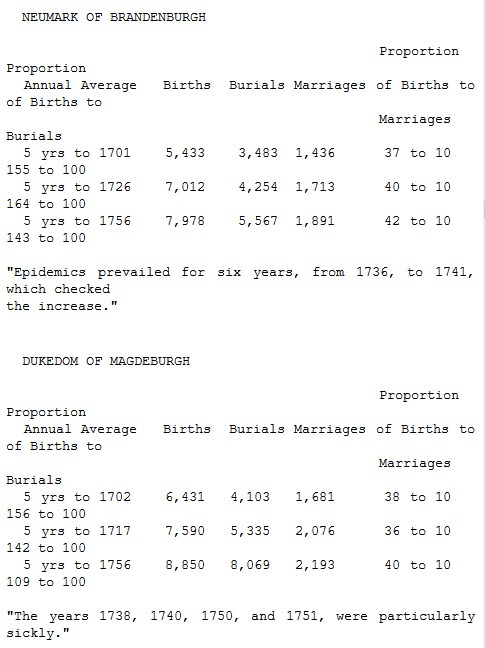
For further information on this subject, I refer the reader to Mr Suessmilch's tables. The extracts that I have made are sufficient to shew the periodical, though irregular, returns of sickly seasons, and it seems highly probable that a scantiness of room and food was one of the principal causes that occasioned them.
It appears from the tables that these countries were increasing rather fast for old states, notwithstanding the occasional seasons that prevailed. Cultivation must have been improving, and marriages, consequently, encouraged. For the checks to population appear to have been rather of the positive, than of the preventive kind. When from a prospect of increasing plenty in any country, the weight that represses population is in some degree removed, it is highly probable that the motion will be continued beyond the operation of the cause that first impelled it. Or, to be more particular, when the increasing produce of a country, and the increasing demand for labour, so far ameliorate the condition of the labourer as greatly to encourage marriage, it is probable that the custom of early marriages will continue till the population of the country has gone beyond the increased produce, and sickly seasons appear to be the natural and necessary consequence. I should expect, therefore, that those countries where subsistence was increasing sufficiency at times to encourage population but not to answer all its demands, would be more subject to periodical epidemics than those where the population could more completely accommodate itself to the average produce.
An observation the converse of this will probably also be found true. In those countries that are subject to periodical sicknesses, the increase of population, or the excess of births above the burials, will be greater in the intervals of these periods than is usual, caeteris paribus, in the countries not so much subject to such disorders. If Turkey and Egypt have been nearly stationary in their average population for the last century, in the intervals of their periodical plagues, the births must have exceeded the burials in a greater proportion than in such countries as France and England.
The average proportion of births to burials in any country for a period of five to ten years, will hence appear to be a very inadequate criterion by which to judge of its real progress in population. This proportion certainly shews the rate of increase during those five or ten years; but we can by no means thence infer what had been the increase for the twenty years before, or what would be the increase for the twenty years after. Dr Price observes that Sweden, Norway, Russia, and the kingdom of Naples, are increasing fast; but the extracts from registers that he has given are not for periods of sufficient extent to establish the fact. It is highly probable, however, that Sweden, Norway, and Russia, are really increasing their population, though not at the rate that the proportion of births to burials for the short periods that Dr Price takes would seem to shew. (See Dr Price's Observations, Vol. ii, postscript to the controversy on the population of England and Wales.) For five years, ending in 1777, the proportion of births to burials in the kingdom of Naples was 144 to 100, but there is reason to suppose that this proportion would indicate an increase much greater than would be really found to have taken place in that kingdom during a period of a hundred years.
Dr Short compared the registers of many villages and market towns in England for two periods; the first, from Queen Elizabeth to the middle of the last century, and the second, from different years at the end of the last century to the middle of the present. And from a comparison of these extracts, it appears that in the former period the births exceeded the burials in the proportion of 124 to 100, but in the latter, only in the proportion of 111 to 100. Dr Price thinks that the registers in the former period are not to be depended upon, but, probably, in this instance they do not give incorrect proportions. At least there are many reasons for expecting to find a greater excess of births above the burials in the former period than in the latter. In the natural progress of the population of any country, more good land will, caeteris paribus, be taken into cultivation in the earlier stages of it than in the later. (I say 'caeteris paribus', because the increase of the produce of any country will always very greatly depend on the spirit of industry that prevails, and the way in which it is directed. The knowledge and habits of the people, and other temporary causes, particularly the degree of civil liberty and equality existing at the time, must always have great influence in exciting and directing this spirit.) And a greater proportional yearly increase of produce will almost invariably be followed by a greater proportional increase of population. But, besides this great cause, which would naturally give the excess of births above burials greater at the end of Queen Elizabeth's reign than in the middle of the present century, I cannot help thinking that the occasional ravages of the plague in the former period must have had some tendency to increase this proportion. If an average of ten years had been taken in the intervals of the returns of this dreadful disorder, or if the years of plague had been rejected as accidental, the registers would certainly give the proportion of births to burials too high for the real average increase of the population. For some few years after the great plague in 1666, it is probable that there was a more than usual excess of births above burials, particularly if Dr Price's opinion be founded, that England was more populous at the revolution (which happened only twenty-two years afterwards) than it is at present.
Mr King, in 1693, stated the proportion of the births to the burials throughout the Kingdom, exclusive of London, as 115 to 100. Dr Short makes it, in the middle of the present century, 111 to 100, including London. The proportion in France for five years, ending in 1774, was 117 to 100. If these statements are near the truth; and if there are no very great variations at particular periods in the proportions, it would appear that the population of France and England has accommodated itself very nearly to the average produce of each country. The discouragements to marriage, the consequent vicious habits, war, luxury, the silent though certain depopulation of large towns, and the close habitations, and insufficient food of many of the poor, prevent population from increasing beyond the means of subsistence; and, if I may use an expression which certainly at first appears strange, supercede the necessity of great and ravaging epidemics to repress what is redundant. Were a wasting plague to sweep off two millions in England, and six millions in France, there can be no doubt whatever that, after the inhabitants had recovered from the dreadful shock, the proportion of births to burials would be much above what it is in either country at present.



